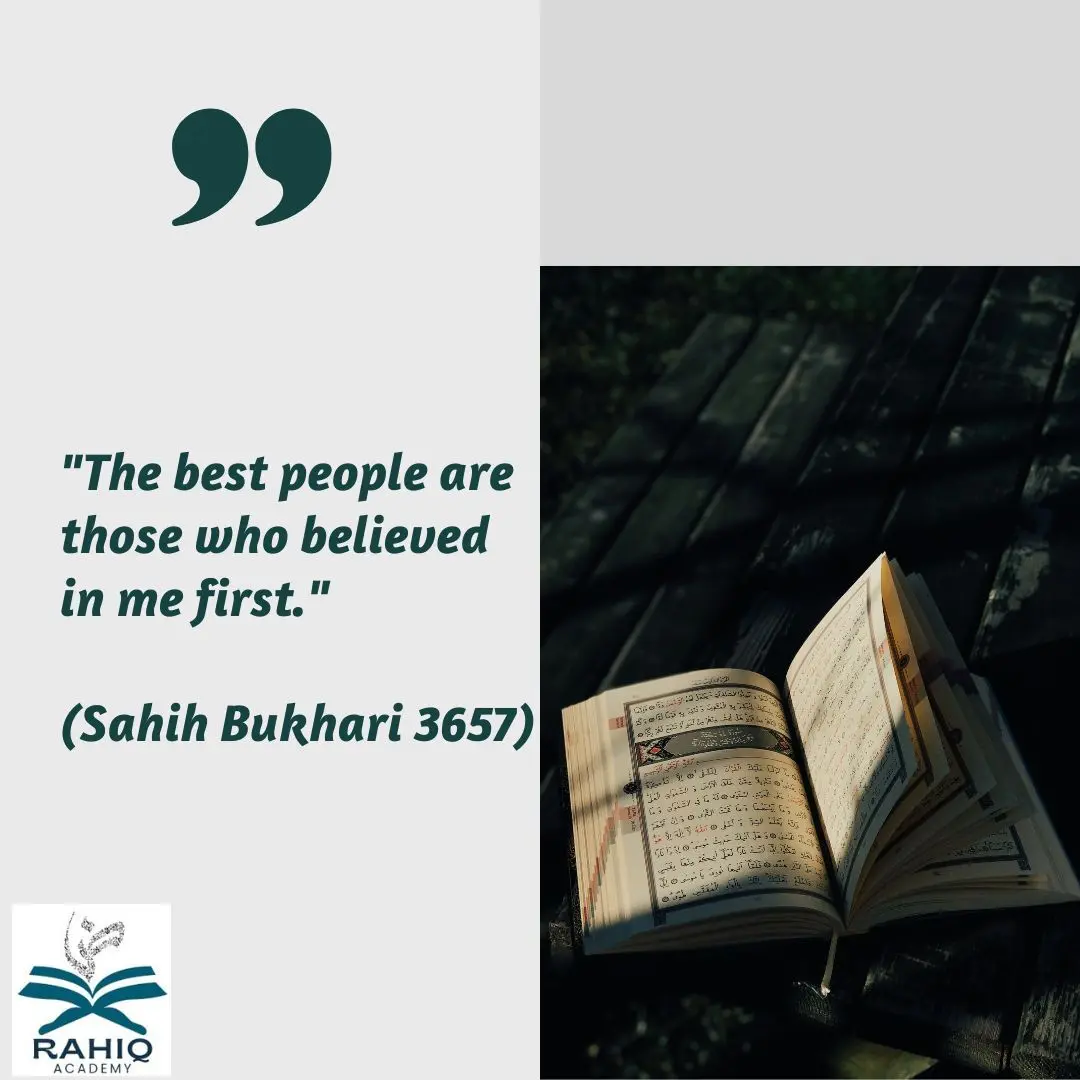Said ibn Zayd a man who dedicated his life to Islam, fought for its cause, and was honored as one of the ten companions promised paradise.
he was among the earliest converts to Islam, standing firm despite severe persecution in Makkah and fought in the most decisive battles and played a crucial role in the early Islamic conquests. Despite his heroism, he remained humble, never seeking political power or wealth. said ibn zayd biography was a testament to sincerity, justice, and unwavering commitment to Allah.
Early Life of Said Ibn Zayd
Early life of Said Ibn Zayd was in Makkah while he was born into the Banu Adi clan, a respected branch of the Quraysh tribe. His family was known for its wisdom, leadership, and strong moral values.
The most influential figure in his early life was his father, Zayd ibn Amr ibn Nufayl. Unlike the Quraysh, who worshipped idols, Zayd ibn Amr rejected polytheism and sought the monotheistic faith of Prophet Ibrahim (AS). He would often proclaim:
“I worship the Lord of Ibrahim, and I do not associate partners with Him.” (Ibn Ishaq, Seerah of the Prophet ﷺ)
He was known for his compassion and justice, refusing to consume meat sacrificed to idols and openly criticizing the Quraysh for their idol worship and mistreatment of women.
When his son Said ibn Zayd (RA) was still young, Zayd ibn Amr gave him a final piece of advice before passing away:
“O my son, a prophet will soon emerge from our people. If you live to see him, follow him and support him.”
These words stayed with Said ibn Zayd (RA), preparing him for the moment when he would accept Islam without hesitation.
Said Ibn Zayd’s Family
Said Ibn Zayd’s family played a significant role in early Islamic history. He was the son of Zayd bin Amr, a member of the Adi clan of the Quraysh tribe in Mecca, and Fatima bint Ba’ja from the Khuza’a tribe.
His father was known for rejecting idolatry and advocating monotheism, which influenced Said’s early adoption of Islam. Said married Fatima bint Al-Khattab, sister of Umar ibn Al-Khattab, who later became a prominent caliph.
This marriage connected him closely to influential figures within Islam. Throughout his life, Said Ibn Zayd remained devoted to spreading Islam and participated in several key battles alongside other companions of Prophet Muhammad
Marriage to Fatimah bint al-Khattab (RA)
Said ibn Zayd (RA) was married to Fatimah bint al-Khattab (RA), the sister of Umar ibn al-Khattab (RA). Their household became one of the earliest centers of Islam in Makkah, where Quranic verses were recited in secret while the Quraysh intensified their oppression against Muslims.
The Role of Fatimah bint al-Khattab (RA) in Umar’s Conversion
At that time, Umar ibn al-Khattab (RA) was one of Islam’s fiercest opponents. He viewed Islam as a threat to the unity of the Quraysh and vowed to stop its spread. One day, in a fit of anger, he decided to kill the Prophet ﷺ.
On his way, a man stopped him and said:
“Why don’t you deal with your own family first? Your sister and her husband have already accepted Islam!”
Umar (RA), shocked and furious, stormed into Said ibn Zayd’s house, where he found Fatimah (RA) and Said (RA) reciting the Quran. Overcome with rage, he attacked his sister, hitting her so hard that she bled.
But instead of giving in to fear, Fatimah (RA) stood her ground and declared:
“Yes, we are Muslims! Do whatever you want, but we will not leave the truth!”
Seeing her conviction, Umar (RA) hesitated and asked to see what they were reading. He was handed a copy of Surah Taha, and as he read, his heart softened.
إِنَّنِي أَنَا اللَّهُ لَا إِلَٰهَ إِلَّا أَنَا فَاعْبُدْنِي وَأَقِمِ الصَّلَاةَ لِذِكْرِي
“Indeed, I am Allah. There is no deity except Me, so worship Me and establish prayer for My remembrance.”
(Surah Taha 20:14)
Tears filled his eyes. That moment changed his life forever. Umar (RA) embraced Islam, and his conversion became one of the greatest victories for the Muslim community.
Said ibn Zayd (RA) and Fatimah (RA) had played a direct role in bringing one of the greatest companions to Islam.
Conversion to Islam

Said ibn Zayd (RA) was among the first people to accept Islam. His belief was not based on family pressure or societal norms—it was a conscious choice rooted in his search for truth.
The Prophet ﷺ once said about those who accepted Islam early:
“The best people are those who believed in me first.”
(Sahih Bukhari 3657)
Despite knowing the consequences of his choice, Said ibn Zayd (RA) remained steadfast, proving his unshakable belief in Islam.
Emigration to Madinah
As persecution against Muslims grew, Prophet Muhammad ﷺ ordered the believers to migrate to Madinah. Said ibn Zayd (RA) and Fatimah (RA) were among those who undertook this difficult journey (emigration to Madinah), leaving behind their wealth, homes, and family for the sake of Allah.
When they arrived, the Ansar of Madinah welcomed them with open arms. Said ibn Zayd (RA) took part in establishing one of the first Islamic societies, where Muslims could finally practice their faith without fear of persecution.
Allah honored the Muhajirun (migrants) in the Quran:
وَالَّذِينَ هَاجَرُوا فِي اللَّهِ مِنْ بَعْدِ مَا ظُلِمُوا لَنُبَوِّئَنَّهُمْ فِي الدُّنْيَا حَسَنَةً ۖ وَلَأَجْرُ الْآخِرَةِ أَكْبَرُ
“And those who emigrated for the cause of Allah after they had been wronged—We will surely settle them in this world in a good place; but the reward of the Hereafter is greater.”
(Surah An-Nahl 16:41)
Said Ibn Zayd (RA) During the Time of the Caliphs
After the passing of Prophet Muhammad ﷺ, Said ibn Zayd (RA) continued to play an essential role in supporting Islamic leadership during the time of the Caliphs.
He remained a trusted advisor to the Rightly Guided Caliphs, standing firm in defending the truth but never seeking power for himself.
His Role During Abu Bakr’s Caliphate (RA)
When Abu Bakr as-Siddiq (RA) became the first caliph, he faced a critical challenge—the Ridda Wars, where various Arab tribes rebelled against Islam. Many falsely claimed prophethood, while others refused to pay Zakat (obligatory charity).
Said ibn Zayd (RA) stood by Abu Bakr (RA) and actively participated in these battles, ensuring that the unity of the Muslim Ummah remained intact. The Prophet ﷺ had once said about Abu Bakr (RA):
“If I were to take a Khalil, I would have taken Abu Bakr, but he is my brother and my companion (in Islam).”
Like Abu Bakr (RA), Said ibn Zayd (RA) saw Islam as a mission that must be defended at all costs, and he played a critical role in restoring stability.
His Role During Umar Ibn Al-Khattab’s Caliphate (RA)
During the caliphate of Umar ibn al-Khattab (RA)—his own brother-in-law and cousin—Said ibn Zayd (RA) continued to serve Islam selflessly. He participated in major military conquests, including the Battle of Yarmouk (636 CE), where the Muslim army defeated the powerful Byzantine Empire.
The Battle of Yarmouk was a decisive victory, marking the expansion of Islam into Syria. Despite playing a key role in this historic battle, Said ibn Zayd (RA) never sought recognition or leadership, embodying the humility and sincerity of a true believer.
Umar (RA) deeply respected him and would often consult him in matters of justice and governance.
His Role During Uthman and Ali’s Caliphates (RA)

During the time of Caliph Uthman ibn Affan (RA), Said ibn Zayd (RA) distanced himself from politics. When internal conflicts arose, he chose to avoid civil disputes, preferring instead to focus on worship and spiritual reflection.
The same was true during the caliphate of Ali ibn Abi Talib (RA), when the First Fitnah (Islamic civil war) occurred. Rather than siding with any faction, Said ibn Zayd (RA) chose neutrality, upholding the principle that Muslims should avoid unnecessary conflict among themselves.
The Prophet ﷺ had warned about the dangers of division and civil strife:
“When two Muslims fight each other with swords, both the killer and the killed will be in Hell.”
(Sahih Muslim 2888)
Said ibn Zayd (RA) embodied the wisdom of this Hadith, choosing peace over power.
Said Ibn Zayd final years
As he grew older, Said ibn Zayd (RA) withdrew from public life, dedicating his time to worship, reflection, and remembrance of Allah.
However, Said Ibn Zayd final years were marked by an incident that showed the power of divine justice.
The False Accusation
A woman named Arwa bint Uways falsely accused Said ibn Zayd (RA) of stealing her land. The accusation was completely baseless, but she persisted, even taking the case to the authorities.
Deeply hurt by this falsehood, Said ibn Zayd (RA) made a supplication (dua) against her, saying:
“O Allah, if she is lying, take away her sight and let her die on that land.”
Shortly after, Arwa became blind, and one day while walking on the same land, she fell into a well and died. This event became a powerful reminder of the consequences of false accusations.
The Prophet ﷺ had warned against false accusations:
“Whoever falsely takes even a handspan of land, Allah will make him wear a necklace of seven Earths on the Day of Judgment.”
(Sahih Bukhari 2454, Sahih Muslim 1610)
His Passing
Said ibn Zayd (RA) passed away in 51 AH (671 CE) at the age of approximately 70 years. His funeral prayer was led by the great scholar Saeed ibn Al-Musayyib, and he was buried in Al-Aqiq, near Madinah.
Despite being one of the ten promised paradise, he never sought fame or leadership. His life was one of humility, sacrifice, and absolute devotion to Allah.
Conclusion
Said Ibn Zayd biography is a shining example of what it means to be a true believer. His life teaches us that:
- Faith is about action, not titles: Despite being one of the most important figures in Islamic history, he remained humble and devoted to worship.
- Truth always prevails: From his early acceptance of Islam to the false accusation against him, his story proves that Allah’s justice never fails.
- Service to Islam is the greatest honor :Whether on the battlefield or in daily life, he dedicated himself to the cause of Islam, without seeking personal gain.
His legacy reminds us that true greatness lies in serving Allah sincerely, not in seeking status or recognition.
Join Rahiq Academy & Deepen Your Knowledge
At Rahiq Academy, we are committed to preserving and teaching the rich history of Islam, the life of the Prophet ﷺ, and the stories of his noble companions.
Join us in our Quran, Arabic, and Islamic Studies programs to learn more about figures like Said Ibn Zayd biography and how their sacrifices and contributions shaped the world.
Enroll today and be part of a journey to connect with authentic Islamic knowledge!




